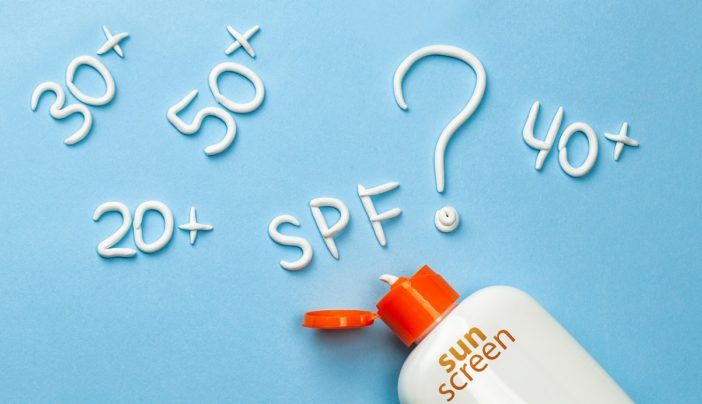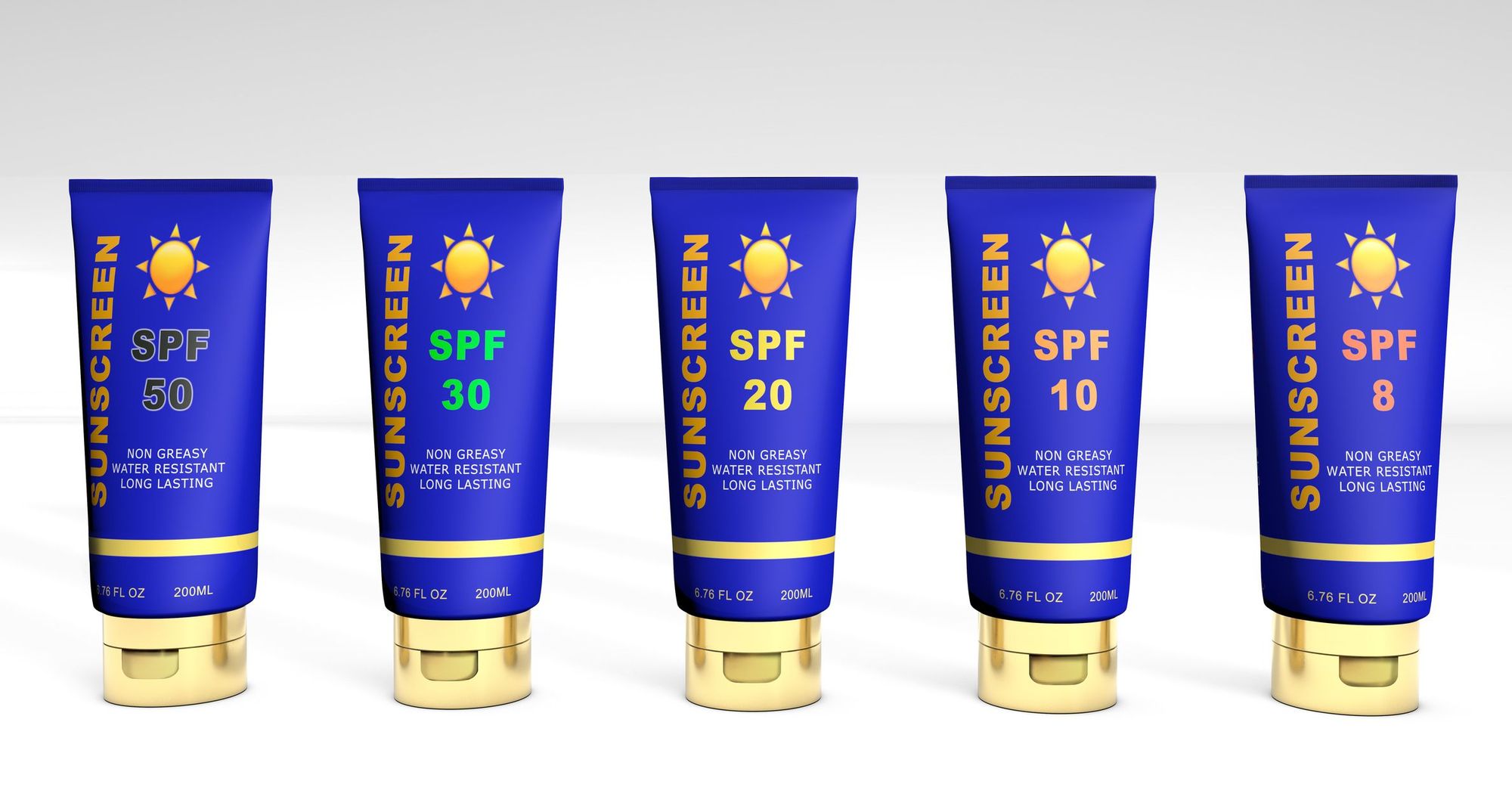Sun Protection Factor: SPF Sunscreen Explained


Sunscreen is an essential aid in our fight against the sun's damaging rays. However, with brands promoting various SPF ratings, understanding what SPF actually means and the science behind it can be difficult.
The article peels back the layers to discuss SPF and how it protects skin.
What is SPF?
UVB rays, though less penetrating than UVA rays, pack a powerful punch when it comes to harming our skin.
Here's a breakdown of the science behind their damaging effects:
- UVB rays are a form of ultraviolet radiation that has enough energy to directly damage the DNA within skin cells. UVB rays may penetrate the molecular structure of our DNA, specifically a component known as thymine. This can cause two thymine molecules to connect improperly, resulting in a "Thymine Dimer." This alters the usual DNA coding, preventing correct cell activity.
- In rare situations, the high intensity of UVB rays can directly destroy the phosphodiester links that constitute the backbone of our DNA. These breaks cause gaps and alterations in the genetic code, further impairing cellular function. Cells scramble to repair the damaged DNA, which can sometimes lead to uncontrolled cell division. This abnormal replication can be a stepping stone on the path to skin cancer.
- Apoptosis is a natural cell death process that removes damaged or diseased cells. UVB radiation can inhibit this process, enabling damaged cells to stay alive and potentially develop cancer.
- UVB radiation can also weaken the immune system's reaction in the skin. This reduces the body's capacity to detect and remove abnormal cells that may form as a result of DNA damage.
- Sunburn symptoms include redness, swelling, and discomfort, which are the body's initial inflammatory reaction to UVB-induced DNA damage. This inflammation is the body's effort to isolate and heal the damage.
Here's a widespread misconception: SPF does not immediately correlate to how much time you can spend in the sun. Rather, it reflects a ratio. For example, an SPF 30 sunscreen allegedly helps your skin to burn 30 times slower than without sunscreen. However, skin type, sun exposure, and sweating can all have an impact on this.
Protection Ratio:
Consider SPF as a multiplier for your skin's inherent resistance to UVB radiation. For example, if it generally takes 10 minutes for your exposed skin to get red in the sun, an SPF 30 sunscreen would potentially increase that time by a factor of 30. In this case, it may take 300 minutes (5 hours) to see comparable reddening when applying SPF 30 sunscreen.

The SPF (Sun Protection Factor) scale is not linear:
• SPF 15 blocks 93% of UVB rays
• SPF 30 blocks 97% of UVB rays
• SPF 50 blocks 98% of UVB rays
So, it can be said that SPF 30 sunscreen only gives you 4% more protection than the SPF 15 sunscreen. Or:
• SPF 15 (93% protection) allows 7 out of 100 photons through
• SPF 30 (97% protection) allows 3 out of 100 photons through.
So, while you are not double your degree of protection, an SPF 30 will block half of the radiation that an SPF 15 would allow through to your skin. It's difficult, but most dermatologists support applying an SPF of 30 or greater.
Why not use a really high SPF Sunscreen?
Sunscreens with extremely high SPFs, such as SPF 75 or SPF 100, do not provide considerably more protection than SPF 30 and might cause individuals to believe they have more protection than they do. Furthermore, in order to provide broad spectrum protection, the UVA protection should be at least one-third of the UVB protection. High SPF sunscreens typically provide significantly more UVB than UVA protection, creating a misleading sensation of complete protection.
But all these do not entirely promise you an anti-tanned skin. That’s the most important reason why we should not only rely on sunscreen alone for a better, healthier and glowing skin. Self-care plays also a crucial role in the process like frequently taking services from salons and applying home-made skin brightening packs made with natural remedies to maintain the health of the skin.
Here are some common misconceptions about SPF:
Higher SPF is dramatically better: While higher SPF sunscreens offer slightly more UVB protection (SPF 30 blocks 97% vs. vs. SPF 50 blocks 98%), the difference is marginal. Both offer significant protection, and SPF 30 is generally recommended for most people.
SPF translates to safe sun exposure time: SPF is a ratio, not a timer. An SPF 30 sunscreen doesn't mean you can spend 30 times longer in the sun without burning. Reapplication is crucial, especially after sweating or swimming.
Sunscreen prevents vitamin D absorption: While sunscreen can slightly reduce vitamin D synthesis, most healthy individuals get enough vitamin D through incidental sun exposure and diet. Talk to your doctor if you have concerns about vitamin D deficiency.
Darker skin tones don't need sunscreen: Melanin, the pigment that gives skin colour, offers some natural protection, but not enough. People with darker skin tones can still burn and are susceptible to skin cancer. Sunscreen is recommended for everyone, regardless of skin colour.
Waterproof sunscreen lasts forever: Water resistance refers to how long protection remains after swimming or sweating. Even water-resistant sunscreens need to be reapplied frequently, especially after extended water exposure or heavy sweating.
Makeup with SPF is enough protection: Makeup with SPF can be a helpful addition to your sun protection routine, but the amount of sunscreen in cosmetics is often low and may not provide adequate coverage for your entire face.
Sunscreen is bad for your skin: Modern sunscreens are formulated to be safe and effective for most people. If you experience irritation, try a different sunscreen or consult a dermatologist.
Sunscreen is unnecessary on cloudy days: UV rays can penetrate clouds, so sunscreen is still important on overcast days.

Choosing the Right SPF: It's Not All About the Highest Number
While the allure of the "Highest sun protection factor" might be tempting, selecting the right SPF for you involves more than just a number. Here's what to consider:
Your Skin Type:
- Fair Skin: If you have fair skin that burns easily, opt for an SPF 30 or higher. This provides significant UVB protection and minimizes the risk of sunburn.
- Medium Skin Tones: For skin tones that tan moderately, SPF 15 or higher can be sufficient. However, if you spend extended periods outdoors or have a history of sunburn, consider SPF 30 for extra protection.
- Darker Skin Tones: While melanin offers some natural protection, sunscreen is still crucial for darker skin tones. Choose an SPF 15 or higher, and prioritize broad spectrum options for UVA/UVB defense.
Your Activities:
- Everyday Use: For daily errands and casual sun exposure, SPF 15 (broad spectrum) is generally adequate.
- Extended Outdoor Activities: If you're planning a day at the beach, hiking, or engaging in other outdoor activities for long stretches, SPF 30 (broad spectrum) or higher is recommended. Reapplication every two hours is essential, especially after swimming or sweating.
SPF Checker Myths:
There's no magic "SPF checker" that determines the perfect SPF for you. However, some resources can guide your selection:
- Dermatologist Consultation: A dermatologist can assess your skin type, sun sensitivity, and lifestyle to recommend the most suitable SPF.
- Skin Cancer Foundation Website: The Skin Cancer Foundation offers valuable information on sun protection and SPF selection based on skin type and activity level.
Remember:
- Reapplication is key! Regardless of SPF, reapply sunscreen every two hours, and more often if sweating or swimming. Aim for a golf ball-sized dollop for your body and enough for a generous layer on your face and ears.
- Broad spectrum protection is vital. Look for sunscreens labelled "Broad spectrum" to ensure protection against both UVA and UVB rays.
- Sun protection goes beyond SPF. Combine sunscreen use with sun-protective clothing, hats, and seeking shade, especially during peak sun hours (10 am to 4 pm).
- Sun protection goes beyond sunscreen. Wear protective clothing, hats with wide brims, and sunglasses that block UVA and UVB rays.
- Sunscreen often gets missed on areas like lips, ears, the tops of feet, and the back of the neck. Be thorough in your application.
- Sunscreen, like any other product, can lose effectiveness over time. Regularly check the expiry date and replace sunscreen that's past its prime.
- Regardless of skin tone, everyone needs sun protection. People with darker skin tones may burn less easily, but they are still susceptible to sun damage and skin cancer.
Beyond Sunscreen:
What is the best overall strategy to protect my skin?
Here’s the answer: It’s important not to rely on high-SPF sunscreens alone. No single method of sun dfence can protect you perfectly. Sunscreen is just one vital part of a strategy that should also include seeking shade and covering up with clothing, including wide-brimmed hats and UV-blocking sunglasses.
It is very necessary to take some extra measures to maintain your skin, to prevent early ageing and to fight sunburns. What measures could you take, you ask?
Well one of the best and easiest ways is to take professional treatments from trusted beauty parlours or salons along with home-made packs. But here emerges the concern of being trusted because our skin is the largest and one of the most sensitive organs of the body. The application of any sensitive, second-rated or not-up-to-the-scratch products on your skin may damage it more than the sun ever could. We can't always entirely rely on home-made remedies or packs because the concern of applying them perfectly and evenly all over your face, neck, arms and other places leaves a doubt.
That's where Ramoni and its home services berge in, to save you from the dilemma!
We, the team Ramoni, understand that feeling confident and beautiful is important and your concerns are also justifiable. That's why we offer a luxurious experience with the comfort of your own home. Our team of skilled stylists and beauty technicians are passionate about their craft and dedicated to providing exceptional service. They stay up-to-date on the latest trends and techniques to ensure you achieve the look you desire.
To know more about our products and services, please visit our Facebook page.